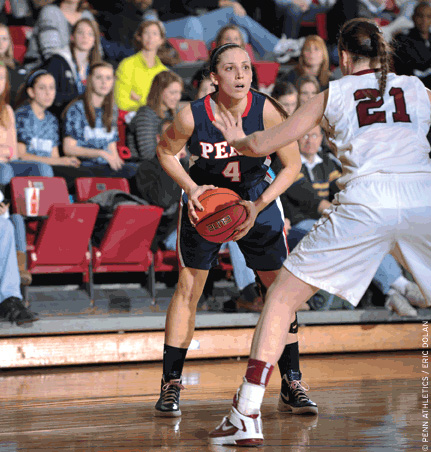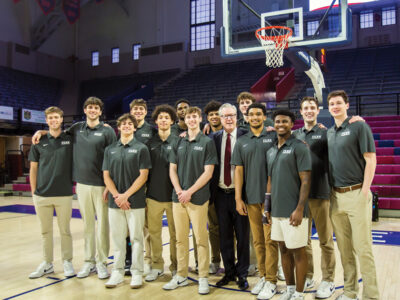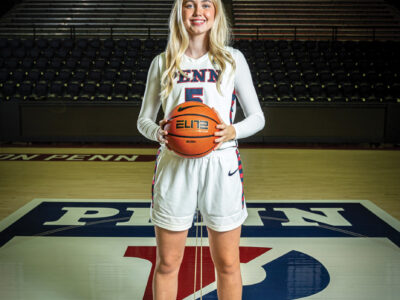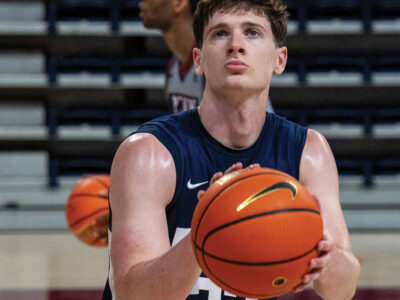
By Dave Zeitlin
A couple hours after the lunchtime rush-hour crowd filters out, Zack Rosen sits in a quiet part of Houston Market, a basketball clutched in his hands. He slaps it from one hand to the other. He extends his right arm, palming the ball over his corner table. He tosses it in the air and catches it. He does it all over again.
Earlier that day, Penn assistant basketball coach Dan Leibovitz had picked up this basketball from the Philadelphia 76ers so Rosen could practice with an NBA regulation ball instead of the standard NCAA ball. There are subtle differences, Rosen notices, but none that should prevent him from continuing his basketball career in the NBA. That, at least, is the goal.
“I genuinely believe I can do it,” says Rosen. “It’s just a matter of some team saying, ‘We believe the same thing.’”
At this point, it would be foolish not to take Rosen at his word. The senior recently completed one of the greatest seasons in the history of Penn basketball.
Just how great was it?
Consider: The do-it-all point guard set the program’s single-season record for assists (173), starts (33), minutes played (1,259), and scored more points (602) than any Quaker since Tony Price W’79 scored 633 during the Quakers’ run to the Final Four in 1978-79. Rosen was the unanimous choice for Ivy League Player of the Year and also won the Robert V. Geasey Award as Big 5 Player of the Year. The Associated Press named him an honorable-mention All-American. And the four-year starter and three-year captain leaves Penn as the program’s all-time leader in assists (588), games started (115), and minutes played (4,198), while his career point total (1,723) is third behind Ernie Beck W’53 and Ugonna Onyekwe C’03.
Led by Rosen, the Quakers finished with 20 wins and a postseason berth in the College Basketball Invitational, falling just one game short of the program’s first Ivy League championship since 2007—all of this after four straight seasons of sub-.500 basketball.
“Just on stats alone, you can say the guy is arguably the best player in the history of Penn basketball,” says Rob Belcore, Rosen’s teammate, classmate, and housemate. “You can’t say enough about what he’s done. His greatest accomplishment, and I helped him at some points, was bringing us from the cellar to almost the top of the mountain again. I know all of us would trade whatever we would have accomplished for just one banner up there, but we came up short.”
That part, the coming-up-short part, was the toughest for Rosen to deal with. After starting the Ivy season at 4-2, the Quakers reeled off seven straight victories—including a dramatic 55-54 win at eventual league champ Harvard—heading into their regular-season finale at Princeton. A win over the archrival Tigers would have given Penn a share of the league title and an improbable spot in a one-game playoff with Harvard to determine the league’s automatic NCAA tournament berth. Instead, the Quakers played one of their worst games of the year en route to a 62-52 loss, which dropped them from a possible NCAA tournament appearance into the far less acclaimed CBI. Even worse was the gloomy realization that Rosen would leave school as the best Penn basketball player never to win a league championship or play in the NCAA tournament.
Following the bitter defeat to the Tigers, Rosen barely spoke at the postgame press conference in the bowels of Princeton’s Jadwin Gymnasium, his head buried in his hands. When the team returned to Philly, he went to the Palestra and stayed there most of the night, looking at the championship banners hanging in the rafters and playing the entire season over and over again his mind. By the time he left—at four o’clock in the morning—he’d come to terms with the fact that the 2011-12 basketball season, while disappointing in the end, was still a memorable one in which the team won games again and, perhaps more importantly, won back student support. That is something he and fellow seniors Tyler Bernardini, Mike Howlett, and Belcore will always have, even if they don’t have a championship ring.
Penn’s unexpected rise to second place in the Ivy League was, perhaps more than anything else, a testament to Rosen’s work ethic. As a freshman, Rosen shot a dismal 28.4 percent from three-point range. Embarrassed by all of the misses, the New Jersey native would not leave the gym until he made 1,000 shots every day between his freshman and sophomore years. The following season, Rosen increased his three-point average by 14 percentage points, even during a tumultuous season in which the Quakers won just six games and head coach Glen Miller was fired in December. The next season, despite enjoying an immediate rapport with new coach Jerome Allen W’09, Rosen admittedly took a small step back, in part because he said he overworked in the summer and broke down physically. For his final year in college, though, the point guard put it all together, blending supreme fitness (playing 40 minutes a game some nights) and the confidence that comes with being a senior leader.
Rosen was at his absolute best with the game on the line—breaking down defenses, splitting double-teams, getting to the free-throw line, and burying impossibly long three-pointers in the final minutes, most notably in the upset of Harvard in Boston.
“Sometimes I didn’t realize how deep they were,” he allows with a laugh. “Sometimes I’m like, ‘I can’t believe Jerome lets me shoot those shots.’”
Rosen’s range should serve him well as he tries to make it in the NBA, which has a deeper three-point line. There are other things working in his favor too, like Harvard grad Jeremy Lin’s remarkable ascent to stardom with the New York Knicks, and perhaps even the recent sale of the Philadelphia 76ers to a few fellow Wharton graduates [“Can Some Quakers Save the Sixers?” Mar|Apr].
“I think if anyone looks at what I’ve done over the past four years, if nothing else, I’ve continually gotten better,” he says. “And I don’t think I’ve hit a ceiling.”
Of course, making the NBA is a tall task for any college basketball player, especially one from a non-power conference. Fortunately, Rosen has plenty of solid backup options if he doesn’t get selected in the NBA Draft on June 28 or sign with a team in the months thereafter. The Jewish guard would love the chance to play professionally in Israel, a country he fell in love with when he visited during the 2009 Maccabiah Games. And inspired by all the lessons he learned from Allen and former high school coach Danny Hurley, Rosen thinks he might like to get into coaching.
“I don’t know what I would do in my life if I wasn’t involved in the game,” Rosen says. “When you’re passionate about something, you can’t ignore it.
“I love this thing. I love the game.”
Knapp’s Guts Highlight Memorable Season for Penn Women

About six minutes into the women’s basketball team’s regular-season finale versus Princeton on March 6, Jess Knapp felt her left knee shift. She collapsed to the floor at Jadwin Gym. In serious pain, the Penn senior limped off the court. Her basketball career should have been over.
Knapp was already playing with a torn ACL, a torn MCL, and a torn posterior meniscus in that same knee, an injury she’d suffered about two months earlier in a game against San Diego State. Knowing it was her last chance to play college basketball, she managed to play through the pain through the rest of the season, which was, in every sense, a truly remarkable achievement. But when she reinjured the knee against Princeton—her doctor would later tell her that the torn part of the ACL, which had likely adhered to another ligament in her knee, had ripped completely off—it looked like the gutsy journey would end, just an hour or so before the actual season did.
Not quite.
Even though Ivy League powerhouse Princeton was busy routing the Quakers, Knapp returned to the game for one reason: so she could finish her college basketball career on her terms, despite the pain.
“It felt weak,” says Knapp, who also missed her freshman season because of a torn ACL in her other knee. “But I was like, ‘After this whole run, I’m not going to end the last game of my career on the bench.’”
Knapp’s guts and determination certainly comprised one of the most compelling storylines of the Penn women’s basketball season. But there were others, too. The Quakers enjoyed their best start in program history, winning four of their first five games. One of their 13 victories was a thrilling overtime triumph over Drexel, their first win over their neighborhood rival since 2006. And sophomore Alyssa Baron lead the league in scoring (16.9 points per game) for the second straight season.
For Knapp, one of only two seniors on the team, seeing those accomplishments through was thrilling, if only because the Quakers’ dismal 2-26 season in 2009-10 was still fresh in her mind.
“Even though I probably cringe every time I hear the numbers 2and 26 in the same sentence, it’s a life lesson and something I’ll never forget,” says Knapp, who finished her Penn career with more than 500 points, 500 rebounds, and nearly 100 blocked shots. “I’m actually happy I was able to have that experience, as awful as it was as I was going through it.”
At this point, Knapp believes the program won’t have to endure anything like that woeful season again. With head coach Mike McLaughlin getting into a groove, and Baron and other underclassmen showing off their talents, the Quakers have enjoyed steady improvements over the past couple of seasons.
Part of the reason Knapp decided to play through an injury that hardly any athlete plays through was to be a part of that growth, and to help the team’s youngest players along. Now, on the eve of her graduation, Knapp is ready to watch the growth continue from the sidelines—the place she never wanted to be until she had to.
“I’m really confident they’re going to do some really big things,” said Knapp, who will work for Teach for America after graduation. “It’s something I’ll always take with me—that, in some way, hopefully, I was able to really impact the program and leave them in a good state.”
Dave Zeitlin C’03 writes frequently for the Gazette and oversees the magazine’s sports blog.




